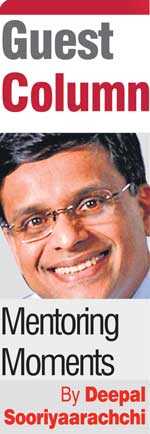Friday Feb 27, 2026
Friday Feb 27, 2026
Monday, 20 July 2020 00:25 - - {{hitsCtrl.values.hits}}
He is a general manager of a very large manufacturing outfit. He is being considered to take up a bigger responsibility of the group in the future. 
Before COVID-19 our discussions had been how he can get his top team in the factory to buy in to the ideas he has. And how to think one step above. How to think the way the board would look at challenges situations and opportunities.
The COVID -19 made his situation very challenging as many other in similar situation. His core competency and the training is in the manufacturing management and the technical aspects of the business. Academically too he has a masters in production management and a sound engineering mind.
The COVID-19 challenge materialised as the factory needed to be run at 50% capacity. He had very good handle on that challenge from the financial and operational point of view. He knew what areas would get compromised in terms of productivity when operated at 50% and what areas could be managed by reducing different overhead factors, etc.
He was very confident in the current situation. His dashboard was full of information that gave him visibility as to how things were moving in this critical phase of the business.
When challenged he realised that marketing was not his pet area and talking with customers and understanding what can influence their demand, etc. was not his cup of tea.
If left unchecked there is the danger of not being prepared to meet the future demands that can be completely different to the current. The example we took was from the textile industry where currently there is a surge in demand for PPE related material but that may not be at such high levels in time to come and the margins on those products will be much different to the consumer products.
So this GM needed to have a closer interaction with the marketing team and build a different set of information to understand what are the real trends that can emerge in the near term, if so what are the areas they should do R&D in terms of material and product innovations, etc. Whether there is an opportunity to leverage the core competency of the organisation and diversify to win in the new world.
If not challenged during the mentoring session this GM would have fallen in to the trap of familiarity-based confidence. This happens to many senior managers who reach higher positions. They fail to embrace the big picture by letting go of their familiar technical discipline. Without realising they continue to micro manage the areas they are very familiar and avoiding the critical non-familiar areas of the business sometimes at great risk.
(The writer is an Accredited Master Coach and a Mentor, with over many years of senior management and board level experience. He can be reached via [email protected].)